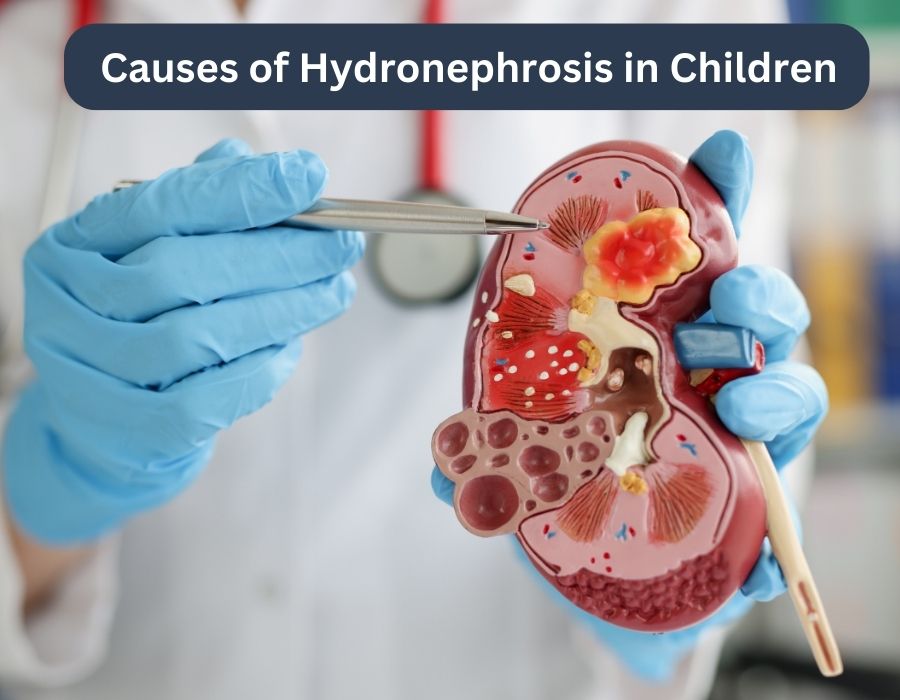Hydronephrosis is a medical condition that affects the kidneys, particularly in children. It is essential to have a clear understanding of the causes of hydronephrosis to seek appropriate medical care, especially when dealing with pediatric patients. In Goregaon, Mumbai, parents can find comfort in knowing that there are pediatric specialists and surgeons like Dr. Saurabh Tiwari who can provide expert guidance and treatment for this condition.
What is Hydronephrosis?
Hydronephrosis is a condition characterized by the swelling or enlargement of one or both kidneys. It occurs when there is an obstruction in the flow of urine, preventing it from draining properly from the kidney to the bladder. This build-up of urine can lead to pressure and stretching of the kidney, potentially causing damage if left untreated.
Common Causes of Hydronephrosis in Children
- Congenital Anomalies: In many cases, hydronephrosis is present at birth and is caused by congenital abnormalities in the urinary tract. These anomalies can include ureteropelvic junction obstruction (UPJ), vesicoureteral reflux (VUR), and posterior urethral valves (PUV). These conditions can hinder the normal flow of urine.
- Ureteral Stones: Kidney stones or ureteral stones can block the urinary tract, causing hydronephrosis. Even small stones can create significant discomfort and pressure within the kidney.
- Tumors: Tumors in or near the urinary tract, though rare in children, can obstruct the flow of urine and lead to hydronephrosis. Pediatric surgeons in Goregaon, Mumbai, may be consulted to assess and address such cases.
- Infections: Severe urinary tract infections (UTIs) can sometimes cause inflammation and scarring, leading to the narrowing of the ureters and subsequent hydronephrosis.
- Injury or Trauma: Physical injury to the abdomen or lower back can damage the urinary tract, resulting in hydronephrosis. Prompt evaluation by a pediatric urologist in Goregaon, Mumbai, is crucial in such cases.
- Neurological Conditions: Some neurological disorders, such as spina bifida, can affect the nerves controlling bladder function, leading to urinary retention and hydronephrosis.
Diagnosis and Treatment
Diagnosing hydronephrosis typically involves a combination of medical history assessment, physical examination, and imaging studies like ultrasound, CT scans, or MRI. Early detection is key to preventing potential complications.
The treatment of hydronephrosis depends on its underlying cause and severity. In mild cases, where the condition is not causing significant discomfort or kidney damage, watchful waiting with regular monitoring may be sufficient. However, in more severe cases or when an underlying condition is identified, intervention is necessary.
Treatment options may include
- Medications: Antibiotics or medications to relieve pain or inflammation may be prescribed, particularly in cases related to infection or stones.
- Surgical Intervention: Surgical procedures, such as pyeloplasty or nephrectomy, may be required to correct anatomical abnormalities or remove obstructions.
- Management of Underlying Conditions: Treating the underlying cause, such as addressing a tumor or neurological disorder, may be necessary to alleviate hydronephrosis.
Conclusion
Understanding the main causes of hydronephrosis in children is crucial for timely diagnosis and treatment. Parents in Goregaon, Mumbai, can find comfort in knowing that there are experienced pediatric specialists and surgeons, including Dr. Saurabh Tiwari, who are well-equipped to provide expert care for pediatric patients dealing with this condition. Early intervention and appropriate medical guidance are essential to ensure the best possible outcomes for children with hydronephrosis. If you suspect that your child may be experiencing symptoms of hydronephrosis, do not hesitate to seek the expertise of a pediatric surgeon in Goregaon, Mumbai, to address the issue promptly and effectively.




